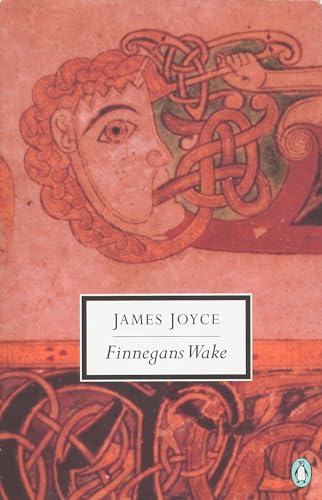Finnegans Wake (Classic, 20th-Century, Penguin)
James Joyce
BOOK REVIEW

Finnegans Wake is not merely a book; it is a labyrinthine journey through the human psyche, a dreamscape where language takes center stage, bending and twisting as if alive. James Joyce, the audacious architect of modernist literature, crafts a mesmerizing tapestry of words that ensnares the reader in its psychedelic embrace. Every page of this 672-page odyssey demands your full attention, challenging you to peel back the layers of meaning and subtext buried within its intricate text. It is a stunning feat of literary ingenuity, and it might just leave you gasping for air-both from wonder and confusion.
Joyce began working on this monumental work in 1922, after the publication of his groundbreaking novel Ulysses. Perhaps it's no surprise that the author, known for his radical experimentation with narrative form, chose to dive headfirst into an even more ambitious project. Finnegans Wake transcends the traditional boundaries of storytelling, eschewing coherent plot structure in favor of streams of consciousness, dreams, and a symphony of languages. This is not a mere novel; it's a multifaceted reflection on time, history, and the human condition, inviting us to engage with the text on an entirely new level.
As you dive into Finnegans Wake, you may find yourself enthralled yet mystified. The writing is a mesmerizing dance of sounds and rhythms, a cacophony that mirrors the chaotic tapestry of existence itself. Critics have rightfully pointed out that to read Joyce's work is to accept an invitation to surrender to the disorienting beauty of language. The text laces and intertwines, revealing profound truths about the cyclical nature of life, death, and rebirth. Indeed, the book blurs the line between the mundane and the divine, seamlessly weaving together themes of myth, history, and folklore.
Readers of Joyce have offered contrasting reactions to this audacious work. Some regard it as an impenetrable fortress of literary ambition, a place where one's wits are tested against language that confounds and delights in equal measure. Others, captivated by its sheer inventiveness, dedicate their intellectual energies to uncovering its secrets, feeling the thrill of discovery with every deciphered passage. Dissecting Finnegans Wake is akin to piecing together a vast puzzle-frustrating, yes, but immensely rewarding as fragments of coherence emerge from the chaos.
The book's structure mirrors the circularity of time, beginning in the middle and progressing both forward and backward, challenging our perception of narrative. It's as if Joyce designed a book that operates in the same way dreams do; fleeting, fragmented, yet laden with meaning. It propels you on a winding route through the subconscious, inviting you to confront universal questions surrounding identity, existence, and the very nature of storytelling itself.
What elevates Finnegans Wake beyond a mere literary experiment is Joyce's mastery of language. His innovative use of portmanteau words, allusions, and puns creates a mesmerizing soundscape that captivates the senses and stirs the imagination. Each sentence is a puzzle piece-sometimes sharp, sometimes smooth-that fits perfectly within the grand design of the text. You will find yourself startled by epiphanies, astonished by the sheer depth of Joyce's linguistic prowess.
The work inspired future literary giants and movements-think postmodernism, with its fragmented narratives and playful disregard for linear storytelling. It has influenced writers like Thomas Pynchon, David Foster Wallace, and even the lyrics of modern musicians, all of whom owe a debt to the groundbreaking creativity Joyce unleashed. The echoes of his genius reverberate through literary history, signaling that the exploration of language and consciousness is far from over.
Finnegans Wake isn't just a book you read; it's a robust encounter with art itself, an invitation to revel in the chaos of existence. So, as you embark on this wild ride, let go of your expectations, and prepare for a journey that may very well challenge you as it enlightens you. It urges you to devour every syllable, every word, with a hungry delight, for in doing so, you may just discover the vast expanse of what it means to be human. The experience is nothing short of transformative. 🚀
📖 Finnegans Wake (Classic, 20th-Century, Penguin)
✍ by James Joyce
🧾 672 pages
1999
#finnegans #wake #classic #20th #century #penguin #james #joyce #JamesJoyce